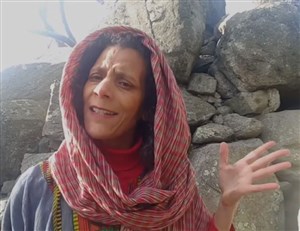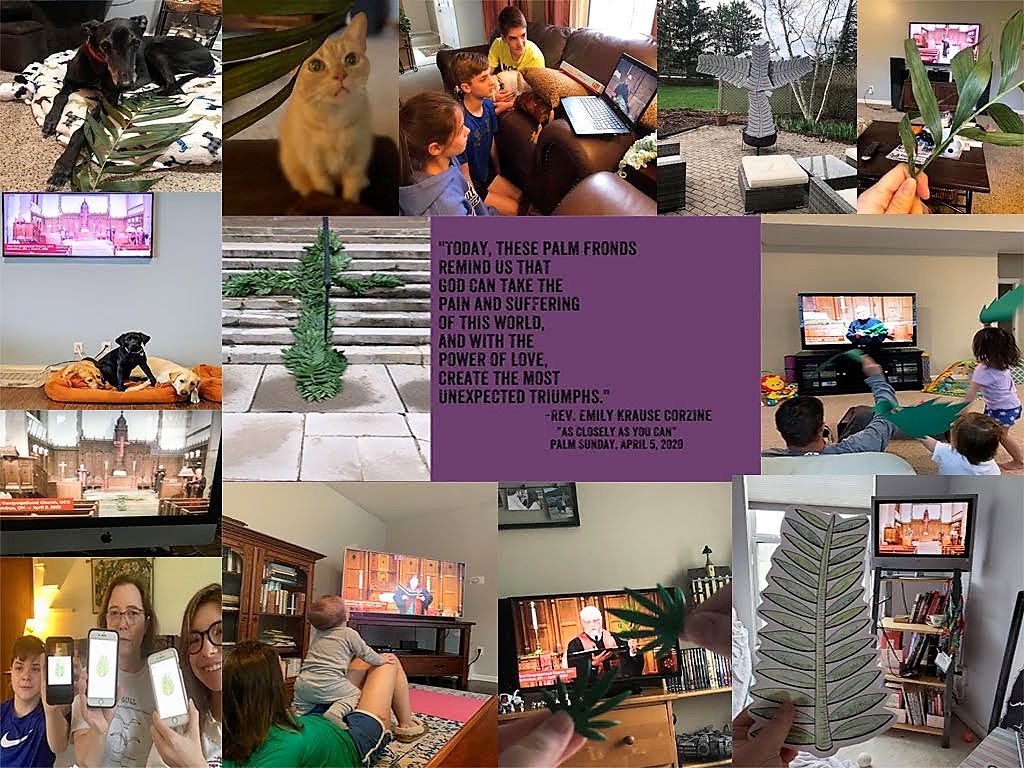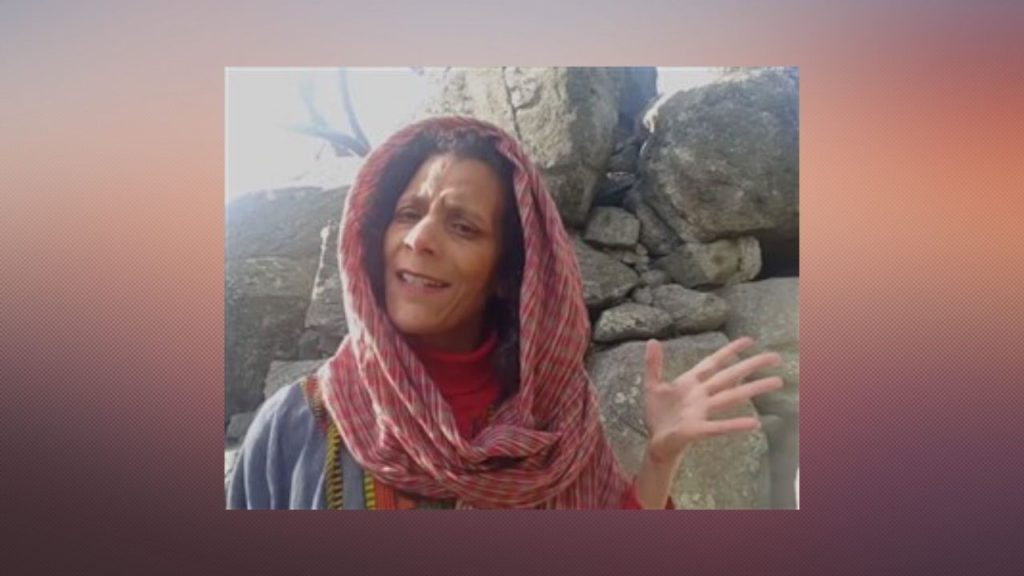After a Holy Week unlike any other, churches have new insights as Easter dawns
Despite the COVID-19 outbreak, and because of it, new insights broke forth from old stories during Holy Week and Easter Sunday in many congregations of the United Church of Christ as pastors and their people – unable to meet in person – made virtual contact over the Internet.
 The central week of the Christian year was like none seen in centuries, as global coronavirus deaths recorded in 2020 exceeded 110,000 on Easter – more than 22,000 of them in the United States. The vast majority of U.S. church buildings were closed. Churchgoers stayed home to keep the disease from spreading, heeding federal guidelines, state health orders and advice from denominational leaders, including UCC officers and Conference ministers.
The central week of the Christian year was like none seen in centuries, as global coronavirus deaths recorded in 2020 exceeded 110,000 on Easter – more than 22,000 of them in the United States. The vast majority of U.S. church buildings were closed. Churchgoers stayed home to keep the disease from spreading, heeding federal guidelines, state health orders and advice from denominational leaders, including UCC officers and Conference ministers.
Yet UCC churches found creative ways to observe the holy days:
- On Maundy Thursday in Columbus, Ohio, a 19th-century abolitionist table at the center of a live-streamed service reminded the people of First Congregational UCC of concern for the world and the simplicity of home Communion. Read related story here.
- On Good Friday in St. Louis, the people of Pilgrim Congregational UCC were vulnerable with each other during a weekly online check-in. Read related story here.
- On Holy Saturday in nearby St. Charles, Mo., members of St. John UCC set out meals and stepped back as low-income and homeless neighbors picked them up. Read related story here.
- On Easter Sunday, with COVID-19 deaths nearing 6,000 in New York City alone, Safe Haven UCC in the Ridgewood section of Queens worshiped joyfully by video conference – and remembered its beginnings as a house church without a building. Read related story here.
Empty buildings, empty tomb
National and regional UCC leaders were encouraging and resourceful, too.
In his videotaped Easter message, the Rev. John Dorhauer, General Minister and President, offered this gloss on Paul’s famous words from the Letter to the Romans: “For I am persuaded that neither death nor life, nor angels, nor demons, nor powers, nor principalities, nor the present, nor the future, nor height, nor depth, nor anything in all creation, including the coronavirus, can separate us from the love of God in Christ Jesus.”
In Southern New England, the Conference emailed in advance to its local churches a YouTube playlist of nine brief worship videos with permission to share them – prayers, hymns even a call to receive offerings. In one, an organ plays “Christ the Lord is Risen Today” over a scroll of beautiful but empty sanctuaries. In another, New Haven storyteller Val Tutson tells the Easter story, portraying one of the women at the empty tomb.
In the far-flung Pacific Northwest – including Washington state, where the first U.S. case of COVID-19 had been confirmed way back on Jan. 21 – the Conference, like many around the UCC, offered at its website a list of its congregations that were streaming some kind of online service. There were 34 of them, from Bellingham, Wash., to remote Wallace, Idaho.
In the UCC’s Southwest Conference, encompassing Arizona, New Mexico and part of Texas, the Rev. Bill Lyons, Conference minister – in an April 1 message – had encouraged churches and members to stay home and embrace the unusual moment.
“Our buildings will be empty,” Lyons said. “It’s Easter. So is the Tomb! And the Church will be full! Full of hope. Full of joy. Full of love. Full of life! Because our buildings are not the Church any more than the tomb was Jesus. The Church will be full because we are the Church. Together, we are the living body of Christ, in the world building a just world for all. Being alive in the world is the whole point of Easter! …
“Our resurrection day is coming. We aren’t sure when. And life won’t be the same. … Be ready; it’s going to be painful. Be ready! It’s going to be glorious! We are going to live again.”
Discovering gifts of being together online
One way life won’t be the same for the four churches profiled in the accompanying articles – and this is true for many churches around the country – is that COVID-19 has forced them to discover the gifts of going online.
 In Columbus, the Rev. Tim Ahrens, First Congregational’s senior minister, gathered 40 deacons and church council members via the webinar platform Zoom on March 12, when Ohio’s stay-at-home order was issued. They decided to suspend in-person worship and gatherings. The church had never offered worship online before, but now it’s streaming via Facebook and YouTube. Participation is increasing every Sunday, Ahrens said. By Palm Sunday it had reached 250 households – including an atheist friend of the church who is intrigued, Ahrens said.
In Columbus, the Rev. Tim Ahrens, First Congregational’s senior minister, gathered 40 deacons and church council members via the webinar platform Zoom on March 12, when Ohio’s stay-at-home order was issued. They decided to suspend in-person worship and gatherings. The church had never offered worship online before, but now it’s streaming via Facebook and YouTube. Participation is increasing every Sunday, Ahrens said. By Palm Sunday it had reached 250 households – including an atheist friend of the church who is intrigued, Ahrens said.
In St. Louis, Pilgrim Congregational had never streamed online before the pandemic either. “People have responded extremely positively,” said its pastor, the Rev. James Ross II. Its in-person congregations skew elderly, with typically 40 to 50 on a Sunday. Now services by Zoom are drawing around 35, “including people who have not been able to attend our in-person service because they are working or don’t live in the area, or for other reasons. Part of what I am trying to discern, along with others, is how we, going forward, make sure that we continue to address whatever it is we have tapped into with this. Despite the difficulty of this moment, we are reaching people.”
In St. Charles, Mo., St. John UCC‘s Sunday services have been carried live for years on KWRE, a 1,000-watt country music radio station in nearby Warrenton, Mo. Because of the pandemic, the church has added a Facebook video stream. The Rev. Lisa Martin, senior pastor, said it has been awkward doing radio and video at the same time – and before an empty sanctuary. But people are learning to use it and it may continue once the pandemic passes. “The whole thing is realizing the opportunity to minister in ways that maybe we should have been doing all along,” Martin said. “The fact that we didn’t have a YouTube channel, shame on us. We didn’t have Facebook Live, shame on us. If that’s where people are connecting, that’s where the church should be.”
In Queens, people have been joining Safe Haven‘s Zoom services from distant places, like Canada and Washington, D.C. The Rev. Ruby Wilson, pastor, has been hearing about it from the church’s leaders:
- “Zoom Church has actually given us an opportunity to invite each other into our homes, and to feel more connected than ever,” said Lisa Jarnot, a seminarian who belongs to Safe Haven. “We have taught each other how to use it. It has been a group learning experience and it feels positive in many ways.”
- Online worship, prayer sessions and Bible studies have kept the church closely connected, said Deacon Jane Joseph. “I sincerely believe that when this is over the only thing that will change for us is the ability to physically hug each other,” she said.
- “Our congregation has been ‘all in,'” said Minister Ruth Shaffer. Compared to churches with highly produced videos, Safe Haven’s Zoom gatherings are simple, “but our experience is honest and heartfelt,” she said. “We will probably continue to minister to our remote congregants after this is over as our experience of church has been deepened by our new practices.”
- And Deacon Judy Jones said, “This has truly cemented our outreach beyond the walls and further forces us to look at how we will use our building when this is over.”
Related News
A Prophetic Call for Justice and Peace in Palestine
The executive leaders of the United Church of Christ have issued the following statement...
Read More‘Love is Greater Than Fear’: Regional Youth Events get to the heart of gospel message
United Church of Christ teens attending this summer’s Regional Youth Events (RYE) are...
Read MoreUCC desk calendars available to order now
Prepare for your day, month and year with the United Church of Christ desk calendar —...
Read More


